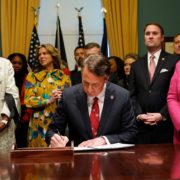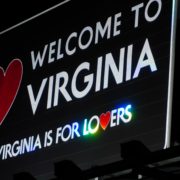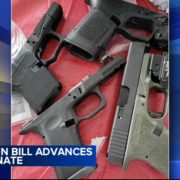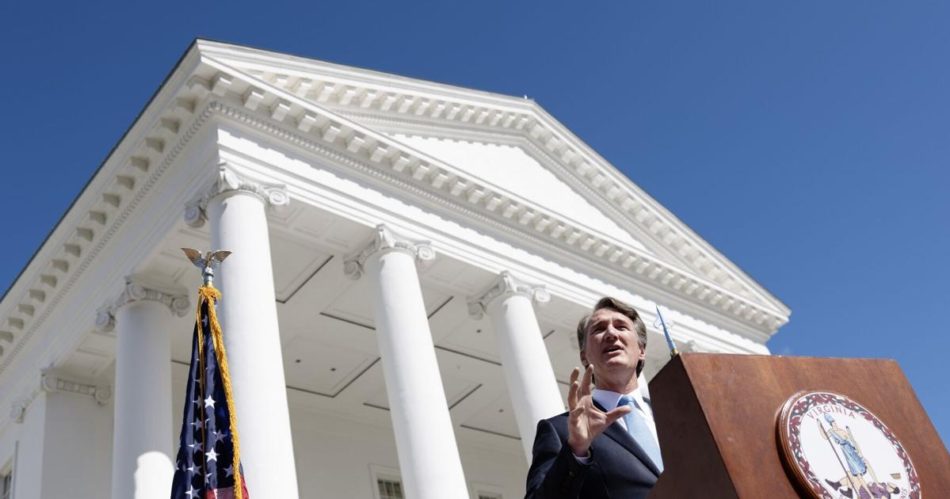Gov. Glenn Youngkin vetoed 30 more bills Tuesday afternoon, many of them gun control measures, including proposals to ban the purchase and sale of assault-style weapons.
He also signed 31 measures and proposed amendments to six.
Youngkin has now vetoed 80 bills so far this year and 121 in his term, breaking Democrat Terry McAuliffe’s record of 120 in his four-year term from 2014 to 2018.

Gov. Glenn Youngkin, seen here speaking outside the state Capitol on March 7, has vetoed 80 bills so far this year and 121 during his term.
“I swore an oath to defend the Constitution of the United States of America and the Constitution of Virginia, and that absolutely includes protecting the right of law-abiding Virginians to keep and bear arms,” Youngkin said in a statement.
“I am pleased to sign four public safety bills which are commonsense reforms with significant bipartisan support from the General Assembly, and offer recommendations to several bills which, if adopted, will make it harder for criminals to use guns in the commission of a violent act.”
People are also reading…
Youngkin has long signaled that he would veto the assault-weapons legislation and other gun control bills. During his State of the Commonwealth address on Jan. 10, Youngkin signaled little interest in further gun restrictions, saying Virginia’s gun laws are already among the toughest in the nation.
On Tuesday he vetoed an array of Democratic gun control measures ranging from age limits to waiting periods, from requirements for concealed carry permits and gun storage, to civil liability rules.

Sen. Creigh Deeds, D-Charlottesville, sponsored the Senate version of the proposed ban on sale of assault-style weapons.
Sen. Creigh Deeds, D-Charlottesville, who sponsored the Senate version of the proposed ban on assault-style weapons, criticized the governor for what he called “shameful and unthinking action.”
News this afternoon that 2 more of my bills, prospectively banning assault style weapons, and keeping guns off college campuses are being vetoed. Shameful and unthinking action!
— Creigh Deeds (@CreighDeeds) March 26, 2024
Del. Dan Helmer, D-Fairfax, sponsored the House version, which Youngkin also vetoed.
Youngkin wrote in his veto message: “The Constitution precludes the Commonwealth from prohibiting a broad category of firearms widely embraced for lawful purposes, such as self-defense. Despite this, certain members of the General Assembly have pursued legislation banning most contemporary semiautomatic firearms and specific ammunition-feeding devices.”
The governor added: “Like all Virginians, I am profoundly troubled by the occurrences of mass shootings and crimes committed with firearms. The pain and sorrow inflicted by criminals with heinous intentions are truly heart-wrenching and should not be minimized for our communities, the victims, or their families.”
Youngkin said Virginia should increase penalties for people who commit crimes with guns and do more to reform its behavioral health system.
While the measures differ, 10 states and Washington D.C. restrict assault-style weapons: California, Connecticut, Delaware, Hawaii, Illinois, Massachusetts, Maryland, New Jersey, New York and Washington state.
Youngkin’s vetoes included House Bill 454, sponsored by Del. Katrina Callsen, D-Albemarle, and Senate Bill 383, sponsored by Deeds, which would criminalize possession of a firearm in a building owned or operated by a public institution of higher education.
Youngkin wrote in his veto message: “While I am committed to ensuring well-secured and safe college campuses in Virginia, this legislation does not adequately consider the numerous variations in Virginia’s diverse geographic, cultural, and societal norms across different regions of the Commonwealth.”
Senate Majority Leader Scott Surovell, D-Fairfax, criticized the governor for vetoing his Senate Bill 258 “to clarify when red flag orders can issue & can be used for minors who threaten to shoot up their schools.”
Surovell posted to X: “Public safety is about more than mandatory minimums & locking people up longer.”
Youngkin wrote in his veto message: “The legislation treats the Second Amendment as a secondary right compared to other constitutional guarantees, and the proposed expansion of substantial risk orders is excessively broad and overreaching.”
The four gun-related measures Youngkin signed were House and Senate versions of bills to prevent parents from willfully allowing a child who poses a credible threat of violence to access a firearm and House and Senate bills barring the manufacture, transfer, or possession of an auto sear, an illegal device that converts firearms into an automatic weapon. Del. Michael Jones, D-Richmond, sponsored the House version of the auto sear legislation.
Youngkin has until April 8 to act on hundreds of remaining bills. On April 17 legislators will return to Richmond to take up Youngkin’s vetoes and proposed amendments.
Democrats hold a 21-19 edge in the Senate and a 51-49 edge in the House of Delegates, which means they are unlikely to muster the two-thirds vote required to overturn any of Youngkin’s vetoes.
Youngkin and Democratic legislative leaders are in a standoff over the state’s two-year budget. Youngkin asserts that the spending plan lawmakers adopted before they adjourned March 9 includes $2.6 billion in tax increases as a result of broadened application of the sales tax without offsetting tax cuts, and inclusion of budget language that would require Virginia to rejoin the Regional Greenhouse Gas Initiative.
The governor and his Democratic opponents have both held news conferences to tout their favored versions of the state’s spending plan.
At the state Capitol on Tuesday morning, Sen. Mamie Locke, D-Hampton, extolled the General Assembly’s budget plan and noted that Youngkin was on a record-breaking pace of vetoing bills.
“That is what spoiled brats do when they don’t get what they want,” Locke said.
On Tuesday Youngkin also took part in a bill signing ceremony to highlight a measure that renames the Center for Rural Virginia in honor of former state Sen. Frank Ruff, R-Mecklenburg. Ruff won re-election in November, but then announced he was stepping down from the Senate in order to focus on his cancer treatment.
Virginia General Assembly opens 2024 session

Sen. Bill Stanley, R-Franklin County, sponsored the legislation to remove the medical malpractice cap in cases involving young children.

Sen. Mamie Locke, D-Hampton, has sponsored a state constitutional amendment that would make rights restoration automatic.

Sen. Emily Jordan, R-Isle of Wight opens a door at the Virginia State Capitol on January 10, 2024, in Richmond, Va. MARGO WAGNER/TIMES-DISPATCH

Sen. Danny Diggs, R-York listens to one of his fellow senators speak at the Virginia State Capitol on Wednesday.

Sen. Mamie Locke, D-Hampton looks towards the front of the Virginia State Senate while her fellow senators talk amongst themselves while at ease at the Virginia State Capitol on January 10, 2024, in Richmond, Va. MARGO WAGNER/TIMES-DISPATCH

Sen. Bill DeSteph, R-Virginia Beach, talks to Sen. Louise Lucas, D-Portsmouth, at the state Capitol in January. On Tuesday the Senate Finance and Appropriations Committee, led by Lucas, defeated DeSteph’s meals tax bill.

Senate Majority Leader Scott Surovell, D-Fairfax, says lawmakers are “getting close” to selecting judges for the State Corporation Commission.

Speaker of the House Don Scott Jr. addresses the House of Delegates at the Capitol Building on Wednesday, Jan. 10, 2024. Scott is the first Black Speaker of the House of Delegates of Virginia.

Speaker of the House Don Scott Jr. addresses the House of Delegates at the Capitol Building on Wednesday, Jan. 10, 2024. Scott is the first Black Speaker of the House of Delegates of Virginia.

Speaker of the House Don Scott Jr. addresses the House of Delegates at the Capitol Building on Wednesday, Jan. 10, 2024. Scott is the first Black Speaker of the House of Delegates of Virginia.

Speaker of the House Don Scott Jr. addresses the House of Delegates at the Capitol Building on Wednesday, Jan. 10, 2024. Scott is the first Black Speaker of the House of Delegates of Virginia.

Del. Don Scott Jr., D-Portsmouth becomes emotional before becoming Speaker of the House at the Capitol Building on Wednesday, Jan. 10, 2024.
-

1 Trump Admin Reverses Biden Ban on Rapid-Fire Gun Modifications
-

2 Canada Vs. USA: Who Does Gun Control Better?
-

3 Podcast: Youngkin Wipes Out Slate of Virginia Gun-Control Bills (ft. Cam Edwards)
-

4 Gunfire strikes home in Kenosha’s Lincoln Neighborhood
-

5 Governor Youngkin vetoes dozens of gun control bills
-

6 Virginia governor vetoes dozens of gun control bills
-

7 Youngkin Vetoes Slew of Virginia Gun-Control Bills
-

8 What happens if you get caught with a ghost gun? Pennsylvania House advances measure to ban sale, purchase of untraceable parts
-

9 Youngkin vetoes Virginia assault weapons ban, signs 2 gun control measures
-

10 Governor Youngkin Vetoes Gun Control Bills


